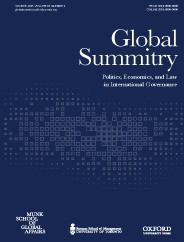
The BRICS: Seeking Privileges by Constructing and Running Multilateral Institutions
Global Summitry
Volume , Issue , 26 July 2016
by: Oliver Stuenkel
DOI: http://dx.doi.org/10.1093/global/guw008
First published online: 29 July 2016
Abstract
How should we think of the decisions made by China and the other BRICS countries to establish a series of new institutions, such as the Asian Infrastructure Investment Bank (AIIB) and the BRICS-led New Development Bank (NDB)? Does such activism show that rising powers are embracing or confronting today’s Western-led order? This article argues that rather than analyzing emerging powers’ beliefs about rules and norms, these new institutions can best be understood as a tool to enhance their capacity to gain privileges of leadership, and slowly reduce the United States’ institutional centrality which provides it with a hegemonic privilege. Such privilege is seen to allow states to break the rules without asking for a “permission slip” and without fearing institutional punishment. The proliferation of non-Western institutions would appear to complement existing ones and allow rising powers to engage in forum shopping on a trans-regional level. Such forum shopping for the BRICS would seem to provide advantages, including reducing their dependence on Western-led institutions when they are perceived by the BRICS and others to serve the interests of established powers.
Read also:
Why Brazil Shouldn’t Turn Its Back on the BRICS (Americas Quarterly)
“Post-Western World” Now Available For Pre-order on Amazon
In Goa, 8th BRICS Summit will focus on consolidating the grouping








